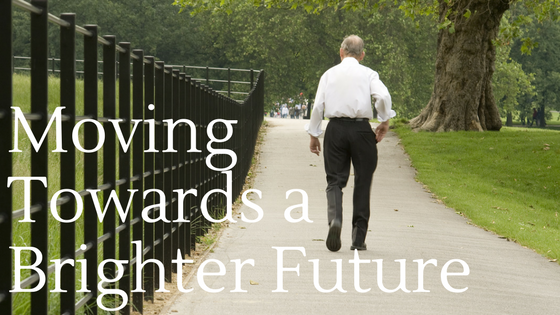Moving Towards a Brighter Future – One Step at a Time
Posted on 11th October 2017

When Peggy, 68, phoned SeniorLine last year she had not spoken to anyone for three days. She is estranged from her family and very lonely. She felt much better after the call and now contacts regularly. Today Peggy gets out more and has joined the local library. A small success perhaps, but a significant advance for her.
SeniorLine is a national confidential listening service for older people provided by trained older volunteers.
For some people, phoning SeniorLine can be that first small step to a new outlook. Kevin began calling when his disability confined him to home. Mairead’s husband died after 47 years of happy marriage. Joan was being bullied by her daughter and did not know where to turn.
Kevin, Mairead and Joan are just three callers out of hundreds who contact SeniorLine each week. Each of them was helped in the way that suited them best. Kevin loves fiction and shares his love of books and television with many volunteers who have similar tastes. Mairead has derived great consolation in talking about her husband and her happy memories. She is now tentatively able to move on, and find some new interests. Joan needed to tell someone that she felt afraid. She subsequently decided to confide in another family member, and an awkward situation is becoming easier.
SeniorLine receives c1, 000 callers a month from women and men all over Ireland who live alone or feel alone. A difficulty faced alone can seem vast and insoluble, and people in crisis may feel helpless, isolated, and unable to think clearly. Telling someone else can be a great relief. Telling someone who listens without judgement and with encouragement can immediately dissipate those isolated feelings, and begin to give some hope. In talking out the problem, people often see it in a different light. It may not look so large or intractable, and there may be new choices in resolving it. SeniorLine is proof that a trouble shared, if not a trouble halved, is usually a trouble lessened.
SeniorLine can also point the way to services now available for older people including our three callers. For example, Kevin may decide to contact Befriending Network Ireland that could visit him at home. Mairead knows that bereavement support and counselling services are available, should she feel she needs them. And Joan is now aware that the HSE has a National Safeguarding Vulnerable Adults Service for people like her at risk of family bullying.
Small positive steps can make a big difference when we are feeling down. Putting our best foot forward to take a walk, sharing a smile with a stranger, making or taking a phone call – all these small positive actions can make a big cumulative difference in how we can feel about ourselves, our lives and our future.
In life, as well as on SeniorLine, problems can loom larger if we turn our back on them. Talking things over with someone that understands can help us feel heard, help us to reframe a problem and perhaps see a way forward.
What are the other tried and true ways to help ourselves to more hope and health? Exercise is an obvious plus. Anything that gets the body moving is valuable. A 15-minute walk every day releases the ‘feel good’ endorphins. Walking with a friend means that we walk the talk. Recent research identifies exercise as one of the five positive actions we can do for ourselves to lower your risk of contracting Alzheimer Disease.
Music, television, film, video, reading provides escape to another world and offers time out from own worries and concerns.
Simple treats can change the mood. It may be a cup of good coffee, crossword, Sudoku, shopping, a takeaway, a small challenge conquered gives a feeling of achievement.
Holding on to rows and resentments is stressful. If nothing can be done, it may be best for our health to let it go. Not every problem is solvable.
Finally, doing something for someone else can be a fail-safe way of feeling better about ourselves, and we are surrounded by these opportunities. It could be reaching out to a neighbour, visiting someone in hospital, fundraising for a charity, or cooking a meal for someone who is ill. Volunteer Ireland has lots more ideas.
(note all names have been changed)


